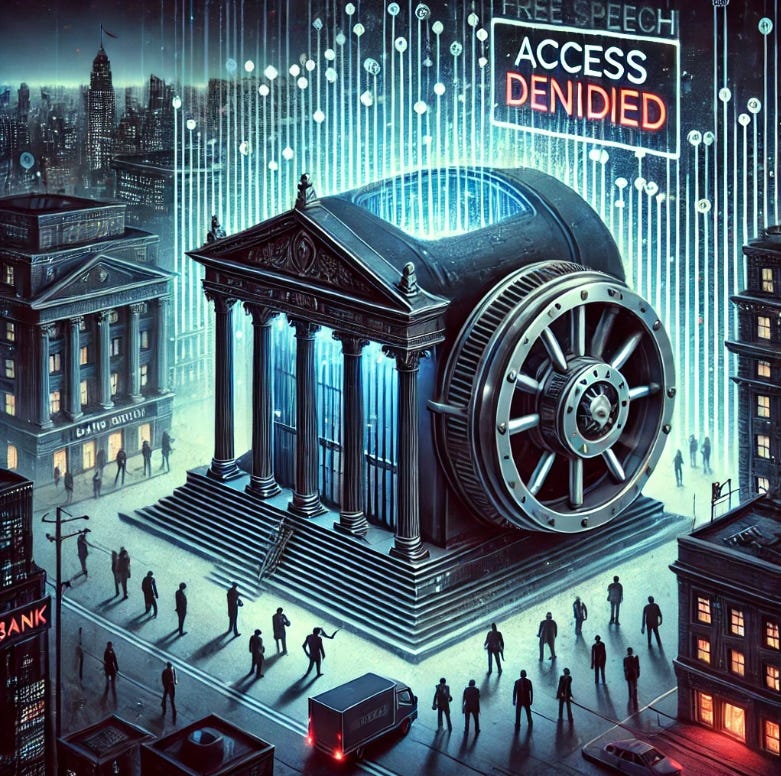Financial Censorship: The Rising Threat of 'De-Banking' to Free Expression
In today's interconnected world, access to financial services is as fundamental as the right to free speech. However, a growing practice known as "de-banking" threatens to undermine both. De-banking occurs when financial institutions close or restrict accounts based on individuals' or organizations' political views or social media activities. This trend not only disrupts personal and business finances but also casts a chilling effect on free expression.
The Mechanics of De-Banking
Traditionally, banks have reserved the right to close accounts associated with illegal activities, such as money laundering or fraud. Recently, however, there have been instances where financial institutions have extended this practice to encompass ideological grounds. For example, in 2023, British politician Nigel Farage had his account with Coutts bank closed, allegedly due to his political views. Documents revealed that the bank considered his views "at odds with our position as an inclusive organization."
Similarly, in the United States, there have been allegations that major banks have closed accounts of individuals based on their political beliefs. A report from The Wall Street Journal highlighted concerns that banks might be discriminating against customers due to their political affiliations.
The Chilling Effect on Free Speech
The implications of de-banking extend beyond financial inconvenience. The mere threat of losing access to essential banking services can deter individuals from expressing dissenting opinions. This phenomenon, known as the "chilling effect," leads to self-censorship, where individuals - even those who may not be members of banks which enact these activities - refrain from voicing their beliefs due to fear of repercussions.
A policy brief by the James Madison Institute emphasizes that being financially de-platformed makes it difficult for individuals to earn a living, thereby suppressing their willingness to engage in free expression.
Notable Legal Battles Highlighting Free Expression
The tension between financial power and free speech is not limited to de-banking. Several high-profile legal battles have underscored the delicate balance between corporate interests and First Amendment rights.
Bollea v. Gawker: In this landmark case, professional wrestler Terry Gene Bollea, known as Hulk Hogan, sued Gawker Media for invasion of privacy after the outlet published portions of a sex tape without his consent. The jury awarded Bollea $140 million in damages, leading to Gawker's bankruptcy. This case highlighted the conflict between privacy rights and freedom of the press.
Trump's Legal Actions Against Media Companies: Former President Donald Trump has engaged in multiple lawsuits against media giants, alleging defamation and bias. Notably, settlements have been reached with companies like Disney and Meta, with Trump receiving substantial sums for his future presidential library. Critics argue that such settlements set a dangerous precedent, potentially intimidating the press and undermining journalistic freedom.
Blake Lively and Justin Baldoni's Legal Dispute: Actors Blake Lively and Justin Baldoni are embroiled in a legal battle involving allegations of sexual harassment and defamation. Lively filed a lawsuit against Baldoni, alleging inappropriate behavior on set and a subsequent smear campaign. Baldoni countersued for defamation, claiming that Lively's accusations were baseless and damaging to his reputation. This case underscores the complex interplay between personal rights and public narratives in the media industry.
A Broader Net: Unintended Consequences
While de-banking primarily targets specific individuals or groups, its repercussions can ripple outward, affecting those who are apolitical or uninvolved in contentious debates. Observing the severe consequences faced by others, many may choose to remain silent on various issues, leading to a homogenization of public discourse. This environment stifles diversity of thought and discourages healthy debate, which are vital components of a vibrant democracy.
Legal and Ethical Concerns
The practice of de-banking raises significant legal and ethical questions. Critics argue that it can lead to unfair discrimination and economic exclusion, particularly for unpopular or marginalized groups, and may even be used as a tool for censorship.
In response to these concerns, legislative measures have been proposed. For example, the "Fair Access to Banking Act" aims to prevent financial institutions from denying services based on political or religious beliefs.
Balancing Free Expression and Financial Practices
To address the challenges posed by de-banking, individuals and organizations can consider the following strategies:
Advocacy and Awareness: Engage in public discourse to raise awareness about the issue of de-banking. Support organizations that defend free speech and financial inclusion.
Alternative Financial Services: Explore the use of decentralized financial technologies, such as cryptocurrencies, which operate independently of traditional banking systems. This approach can provide a safeguard against potential de-banking actions.
Legal Recourse: Stay informed about legal protections against discrimination by financial institutions. If subjected to de-banking, consider seeking legal advice to challenge the action.
Policy Engagement: Support and advocate for legislation that ensures fair access to financial services, regardless of political or religious beliefs.
The rise of de-banking presents a complex challenge at the intersection of finance and free expression. While financial institutions have a responsibility to manage risk, this should not extend to silencing individuals based on their beliefs. A balanced approach that safeguards both the integrity of financial systems and the fundamental right to free speech is essential for a healthy, functioning democracy.
Sources
https://crsreports.congress.gov/product/pdf/LSB/LSB11052/3
https://www.wjtv.com/entertainment-news/15-notorious-celebrity-lawsuits/
https://digital.sandiego.edu/cgi/viewcontent.cgi?article=2984&context=sdlr
https://www.sfgate.com/news/article/Celebrities-image-rights-vs-First-Amendment-2648361.php
https://www.freedomforum.org/famous-copyright-cases/
https://corporate.findlaw.com/litigation-disputes/tiger-woods-and-the-use-of-celebrity-images-in-works-of-art.html
https://corporate.findlaw.com/litigation-disputes/tiger-woods-and-the-use-of-celebrity-images-in-works-of-art.html
https://www.eff.org/issues/right-publicity
https://gbkh.com/practice-area/media-and-first-amendment-law-litigation-and-counseling/




